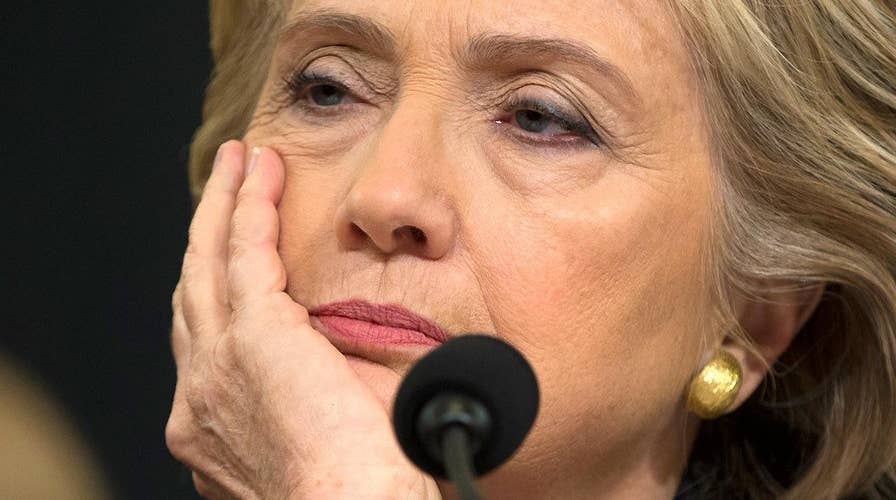Could potential legal troubles hurt Hillary at the polls?
Will the shadow of Clinton's email scandal - and potential legal trouble it could bring - erode her presidential campaign and voters' trust in her? Or will it actually rally her support? The 'On the Record' panel analyzes
This is a rush transcript from "On the Record," January 11, 2016. This copy may not be in its final form and may be updated.
GRETA VAN SUSTEREN, FOX NEWS HOST: The political impact of Secretary Clinton's emails. While we wait to see if they are a legal problem, what about a political problem? Will it hurt Secretary Clinton with Democratic voters?
The ON THE RECORD political panel is here. From "The Daily Beast," Betsy Woodruff and "Townhall's" Guy Benson.
Guy, legal is one issue, another question is political problems in 2016. Do you think that Democratic voters are going to be turned off as they listen to more and more of this?
GUY BENSON, TOWNHALL.COM: Maybe not Democratic voters.
VAN SUSTEREN: Are those the ones she worries about.
BENSON: For now.
VAN SUSTEREN: Independent, too.
BENSON: But I think, she is looking more towards the general election. She is going to be the nominee barring some sort of unforeseen, massive political earthquake.
So she has to be concerned about what voters who at large think about all of this. So far these scandals, absent all the new developments in the last four days. Voters have looked at her as untrustworthy person that they don't view favorably as a politician. That's an issue for her moving forward. And I think what we heard just today from Catherine Herridge in her report it undermines that image even further.
VAN SUSTEREN: Betsy?
BETSY WOODRUFF, THE DAILY BEAST: I think this is probably giving her campaign flashbacks to this summer at the height of the email scandal when she just went -- she just bunkered down, went into hiding, reporters were surrounded by rope lines. It was really bleak for her for a while.
And then when Bernie Sanders said the emails aren't a big deal. Don't worry about it. Things kind of got better. She got more friendly interviews. But, look, if this really metastasizes as the FBI investigation becomes more involved and more of a story, Clinton might be inclined to shy away from being more public and that hurts her.
VAN SUSTEREN: And, you know, it takes only one email to count. You know, that's the problem. You know, to be it a crime, if there is. And I don't know that there is. And I don't know if there is, but one classified information -- one email with classified email on her private server, then she's got problems.
BENSON: Well, she has 1300 classified emails on her private server. That's the number that we know.
VAN SUSTEREN: Which are -- look here the poll results, by the way. 76 percent say that she is worried about that. That's a high percentage. But, I mean, she's got all those -- at least that's what sort of, you know, coming out that there are 1300. But it makes a big difference whether she knew about it or didn't know about it, because one is misdemeanor, one is a felony.
BENSON: Well, that's the thing now. When you look at the classified information, lots of it. That was on her server. She came out last March and said, there is none of it on my server. I didn't email it. I didn't get it. I didn't received it. That turned out to be untrue, more than a thousand times over.
And some of the messages included were top secret information. And it is her job as secretary of state, she signed a memo when she first started at the State Department saying it is my responsibility to recognize top secret information, secret information, whether it's marked or not, that was her duty as secretary of state.
VAN SUSTEREN: You know, Betsy, I just don't think she has explained it. I mean, that the problem. And the reason why this keeps going on and on besides the fact that we have drip, drip, drip with the emails every month from the State Department is I still don't -- I don't have a sense that I understand why she was doing it in the first place.
WOODRUFF: And part of the problem with this reported new probe is that it would go beyond just the question of emails and classification rules. It gets to the very heart of her credibility as a candidate.
The argument that perhaps people in foreign governments who donated to the Clinton foundation got special favors at state. There are examples of this Kingdom of Saudi Arabia getting a $30 billion fighter jet deal after giving $10 million to the Clinton Foundation. This is extraordinary. It stands out. If this probe brings that to the fore, it's a problem.
VAN SUSTEREN: I guess, it's hard when she says she has already said it. And I think to myself, well, then, how come I don't get it because I'm not, you know, I figure I'm of average intelligence. And if she has already explained it, why don't I get it. And so, you know, I'm leaning towards maybe she didn't adequately explain it.

